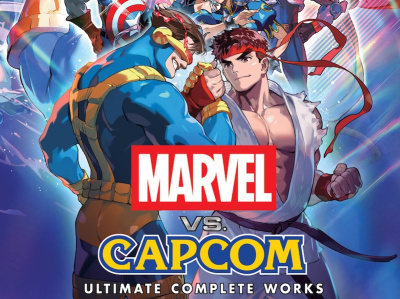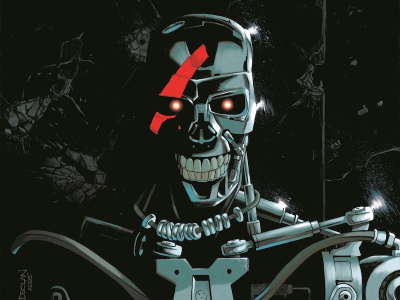I think it was Thomas Jefferson who said "a little rebellion now and then is a good thing." He was talking about government, but the same applies to industries, especially ones that have settled into a rut. Three recent items that caught my attention lately bring this to mind: a podcast featuring a current day insurgent publisher, a book documenting a pretty successful creative revolution now a generation or more in the past, and rumbles of a future uprising against our would-be robot overlords.
The Silver Sprocket Way. Longtime comics business guy Adam (Atom!) Freeman started a podcast recently where he interviews industry insiders on the nuts and bolts of the business. Anyone reading my column or ICv2 in general, which is to say anyone who is nerdy about the business of the nerd business, should probably add it to your media subscriptions, as Adam really digs deep with his subjects.
Of special note is a recent episode where Adam talks to Avi Ehrilch of Silver Sprocket. This year Silver Sprocket delivered one of the more unpredictable moments of the Eisner Awards when Caroline Cash’s PeePee PooPoo won best anthology title over some pretty formidable competition. I’ve been impressed with their books but had no idea how radically they approach every aspect of the business, from creator relations to distribution to curation of titles in their San Francisco retail location.
Ehrlich comes out of a very strong DIY culture, with connections to music and zines as well as comics. In the podcast, he describes the advantages of having transparent relationships with creators, including open spreadsheets where they can track sales and royalties in real time, and a business model where 95% of titles pay a royalty after a year. This remarkable stat is due in part to paying very low advances, and in part to a total commitment to design, market and distribute every title with a lot of advance thought to reaching its best potential audience.
Ehrlich said Silver Sprocket grossed over $1 million in revenues in the past year without using crowdfunding on any of its projects, and has built a strong enough community that fans came together to help rescue the store when its basement flooded last year. That topline number may not be impressive by industry standards at the moment, but every publisher that eventually bootstrapped its way to eight figures of revenue had to cross that milestone at one point.
Not all of Ehrlich’s ideas are scalable or appropriate for the more fan- and collector-driven parts of the business, which he freely admits, but a lot of them are. It’s also worth hearing from a small publisher who, even with a few years in the business, remains optimistic about both the artform and the industry.
Comic Book Punks. I ran across another interesting ground-up industry story in Karl Stock’s Comic Book Punks: How a Generation of Brits Reinvented Pop Culture, a history of the British comics explosion of the 1980s and 90s, which I picked up from UK publisher Rebellion Press in San Diego last month.
Comic Book Punks aspires to be a readable narrative history of an important moment in comics in the style of Sean Howe’s Marvel: The Untold Story or Brian Doherty’s recent Dirty Pictures: A History of Underground Comics. That is, it brings the details to life by focusing on the stories and perspectives of the creators, bringing them onto the stage one at a time and then gathering the threads of their stories until they form a complete tapestry.
Anyone who lived through this period of comics in the English-speaking world probably knows the broad contours of the story: Alan Moore’s groundbreaking burst of creativity, DC’s liquor-fueled prospecting trips to the UK that turned up talents like Jamie Delano, Peter Milligan and Philip Bond, along with superstars like Neil Gaiman, Grant Morrison and Garth Ennis. Comic Book Punks fills in the rest of the picture for us Yanks unfamiliar with the backstory of 2000 AD, Marvel UK, and the independent scene that produced the likes of Eddie Campbell, Bryan Talbot and Hunt Emerson.
I found Comic Book Punks to be at its most intriguing when it covered those early days, including the "prehistory" of the British comics business leading into the late 1970s emergence of 2000 AD, which was the breeding grounds for much of what was to come. Figures like editor/hustler Dez Skinn and Titan Comics and Forbidden Planet cofounder Nick Landau come across particularly colorfully. Stock also does a good job covering lesser known, edgy early works that helped establish the reputations of folks like Morrison and Mark Millar before their bigger successes in the American superhero business.
The nearly 500-page book is both exhaustive and exhausting. At some points, Stock seems like he’s checking off boxes for the "greatest hits;" at others, there is a wealth of detail that lacks a clear point of view. But as a one-and-done accounting of one of the most consequential periods of recent comics history, Comic Book Punks provides a well-researched record for posterity and a few fun anecdotes about the origins of many of today’s senior cohort of active creators.
Artists just won a round against the forces of AI. Late last year, a group of artists including cartoonist Sarah Andersen ("Sarah’s Scribbles") and commercial artist Karla Ortiz filed a class action suit against the makers of generative AI systems like Stable Diffusion and Midjourney. The suit, which claims among other things that the AI products were built using copyrighted materials obtained without the consent of the creators, was not given much chance, considering the ambiguity of copyright laws and the novelty of the technology.
But on Monday night, Judge William H. Orrick of the Northern District Court of California ruled against a summary dismissal of the suit, which means the case will proceed to trial. Significantly, that means that lawyers for the plaintiffs will get to examine documents from the defendants during the discovery process, casting light into the shadowy methods that these tech giants have used to "scrape" the internet for visual data.
The judge set aside a part of the complaint based on violations of the 1998 Digital Millennium Copyright Act, but said there was sufficient evidence for a copyright claim to move to trial.
Ortiz tweeted jubilantly that "We won BIG as the judge allowed ALL of our claims on copyright infringement to proceed and we historically move on The Lanham Act (trade dress) claims! We can now proceed onto discovery!"
Will this be enough to halt the juggernaut of AI in its tracks? Or at least help artists retain some of their rights, income and dignity? Like one of those dystopic science fiction series that dotted the pages of 2000 AD in the late 70s, we’ll have to wait to see how this Future Shock pans out.
The opinions expressed in this column are solely those of the writer, and do not necessarily reflect the views of the editorial staff of ICv2.com.
Rob Salkowitz is the author of Comic-Con and the Business of Pop Culture and a two-time Eisner-Award nominee.

Column by Rob Salkowitz
Posted by Rob Salkowitz on August 13, 2024 @ 5:31 pm CT
MORE COMICS
Marvel Art Books from Three Publishers
July 30, 2025
Three different publishers are offering Marvel-themed art books in coming months.
'Time Before Time' Co-Writers Reunite for New Series
July 30, 2025
McConville and Shalvey, who co-wrote the time-travel mystery Time Before Time, join forces for the next arc of The Terminator.
MORE COLUMNS
Column by Scott Thorne
July 28, 2025
This week, columnist Scott Thorne comments on the Edge of Eternities prerelease and on Magic: The Gathering news from the Hasbro earnings report.
Column by Rob Salkowitz
July 21, 2025
Columnist Rob Salkowitz lays out the Comic-Con panels of interest to industry professionals, current and aspiring creatives, educators, librarians and retailers.










